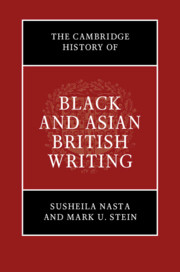Book contents
- The Cambridge History of Black and Asian British Writing
- The Cambridge History of Black and Asian British Writing
- Copyright page
- Dedication
- Contents
- Notes on Contributors
- Preface and Acknowledgements
- Introduction
- Part I New Formations
- Part II Uneven Histories
- (I) Global Locals
- (II) Disappointed Citizens
- (III) Here to Stay
- 19 Sonic Solidarities
- 20 Vernacular Voices
- 21 Narratives of Survival
- 22 Black and Asian British Theatre Taking the Stage
- 23 The Writer and the Critic
- 24 Forging Connections
- 25 Reading the ‘Black’ in the ‘Union Jack’
- Part III Writing the Contemporary
- Select Bibliography
- Index
24 - Forging Connections
Anthologies, Collectives, and the Politics of Inclusion
from (III) - Here to Stay
Published online by Cambridge University Press: 19 December 2019
- The Cambridge History of Black and Asian British Writing
- The Cambridge History of Black and Asian British Writing
- Copyright page
- Dedication
- Contents
- Notes on Contributors
- Preface and Acknowledgements
- Introduction
- Part I New Formations
- Part II Uneven Histories
- (I) Global Locals
- (II) Disappointed Citizens
- (III) Here to Stay
- 19 Sonic Solidarities
- 20 Vernacular Voices
- 21 Narratives of Survival
- 22 Black and Asian British Theatre Taking the Stage
- 23 The Writer and the Critic
- 24 Forging Connections
- 25 Reading the ‘Black’ in the ‘Union Jack’
- Part III Writing the Contemporary
- Select Bibliography
- Index
Summary
This chapter attends to how the use of ‘black’ as a political aesthetic but contested signifier developed throughout the1970s and 1980s, and impacted on literary production. Partly due to such literary and political alliances, pioneering works such as the first ‘black British’ poetry collection, News for Babylon (1984), ground-breaking anthologies of women’s voices such as Watchers and Seekers (1987) or E. A. Markham’s 1989 selection of black and Caribbean poetry, Hinterland, appeared. The voices of new collectives such as the Asian Women’s Writers, Tara Arts or the Southall Black Sisters were published in the 1980s alongside periodicals like Artrage and Wasafiri which began to embed and inscribe black and Asian literary and artistic culture into Britain. This chapter explores the cultural and political landscape of this formative period and charts how these key literary and cultural initiatives opened up the borders of British writing. Discussing the difficult relations between arts sponsorship, policy-making, and creativity, the chapter explores how various pigeon-holes, whether of race, multiculturalism, or cultural diversity have at times limited understanding and serious critical appreciations of the range of black and Asian creative practice.
- Type
- Chapter
- Information
- The Cambridge History of Black and Asian British Writing , pp. 403 - 416Publisher: Cambridge University PressPrint publication year: 2020
- 3
- Cited by

